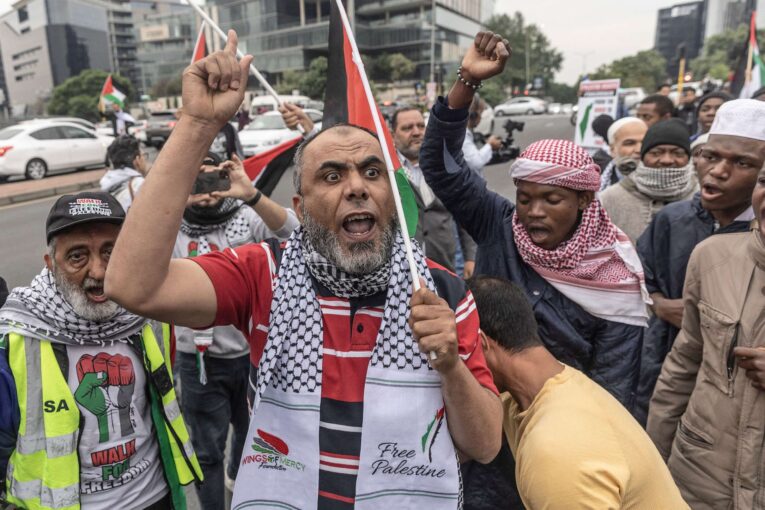Where Africa stands on the Israel-Hamas war

Afp Contributor#afp/AFP via Getty Images
BY JEFFREY SNYDER AND MUSA AKANDE
Africa is not a major player in world politics although, since time immemorial, the world’s leading nations have been exploiting her mineral resources to fuel their economies. However, African leaders have made their voices heard about the Israel-Hamas war since Hamas’s attack on the Jewish nation on October 7.
African Union’s call for an independent Palestinian state
In a statement, African Union’s Chairperson, Moussa Faki Mahamat, expressed his “utmost concern” at the outbreak of the war, fearing its “grave consequences” for the lives of Israeli and Palestinian people. The statement points out the failure of the international efforts to solve the crisis, adding that the “Chairperson wishes to recall the fundamental rights of the Palestinian people, particularly that of an independent and sovereign State, the main cause of the permanent Israeli-Palestinian tension.”
The Arab world’s unequivocal pro-Hamas stance
In the northern region of the continent, Arab leaders stood squarely with Hamas through public statements and massive demonstrations. During the “extraordinary session” of the Arab League Nations, Morocco’s Minister of Foreign Affairs, Nasser Bourita, stated his country’s “full and unwavering support” for Palestine. Referring to the deadlock over the Palestinian issue, he called it a “persistence of systematic violations and oppressive unilateral measures in Al-Quds and the Occupied Palestinian Territories.”
Thousands of Moroccan protesters took to the streets, not only to protest Israel’s massive air strikes that had already killed thousands of civilian Palestinians, but also to ask their government to end the normalization of its relations with Israel. (In exchange for US recognition of Morocco’s sovereignty over the long-disputed Western Sahara territory, Morocco had normalized its relations with Israel.)
A statement attributed to Rachid Fellouli, a pro-Palestinian protester, in an article published by ABC news on October 13, says: “This is a call to the Moroccan state to stop normalization. An appeal to Morocco, which chairs the Jerusalem Committee, to act urgently, to close the liaison office with Israel. And to withdraw from all agreements. This is what Moroccan people demand today.”
Same reaction from Algeria’s Ministry of Foreign Affairs which said in a statement that it was following “with deep concern the escalation of barbaric Zionist aggression against the Gaza Strip, which has cost the lives of dozens of innocent children of the Palestinian people, who have fallen as martyrs to the stubbornness of the Zionist occupation in its policy of oppression and persecution imposed on the valiant Palestinian people.”
In Tunisia, people took to the streets to rally in support for Hamas during national protests that lasted several days.
In a rather nuanced statement, Morocco’s King Mohammed VI, who called an emergency meeting of the Arab League Council in Cairo, “expresses deep concern” and condemns the “attacks against civilians wherever they may be.”
Libya expressed its solidarity with the Palestinian people not only in words, but also in a colorful way, as the 5 El- Emad towers illuminated in the colors of the Palestinian flag in support.
Firm support for Israel and neutral stances
In Kenya, a strong statement issued by the office of President William Ruto “unequivocally” condemned Hamas’s attack and expresses the country’s solidarity with Israel. But the Kenyan leader also said: “In consideration of the complex and delicate context of the security situation in Israel-Palestine, Kenya also makes a call for the de-escalation of violence.”
In neighboring Tanzania, the country’s Ministry of Foreign Affairs, in an apparent move of neutrality, said, “We condemn all forms of violence … We call for restraint to stem further loss of human life.”
For its part, Nigeria’s Ministry of Foreign Affairs called for a “de-escalation and ceasefire” through dialogue. Abuja said it was “deeply concerned” by the outbreak of violence, adding, “The cycle of violence … only serves to perpetuate an unending cycle of pain and suffering for the civilian population that bear the brunt of every conflict.”
South Africa’s pro-Hamas stance
While the South African government deplored the loss of lives on both sides of the war, pointing out the “desperate need of a credible peace process,” its stance on the war is shaped by the country’s history of apartheid during which the Palestinian Liberation Organization was one of its staunchest supporters. Former President Nelson Mandela’s grandson Nkosi Zwelivelile, a member of parliament, stressed that historical tie during one of several anti-Israel protests held in Johannesburg and Cape Town.
South Africa’s Minister of International Relations and Cooperation, Naledi Pandor, is quoted in the video below as saying that “Israel is illegally occupying Palestinian land.” On behalf of the government, she called Hamas leaders and offered her country’s aid. Additionally, President Cyril Ramaphosa said his country is ready to help mediate in the conflict: “South Africa stands ready to work with the international community and to share our experience in mediation and conflict resolution as we have done on the continent and around the world.” The government also called for the immediate cessation of hostilities.

